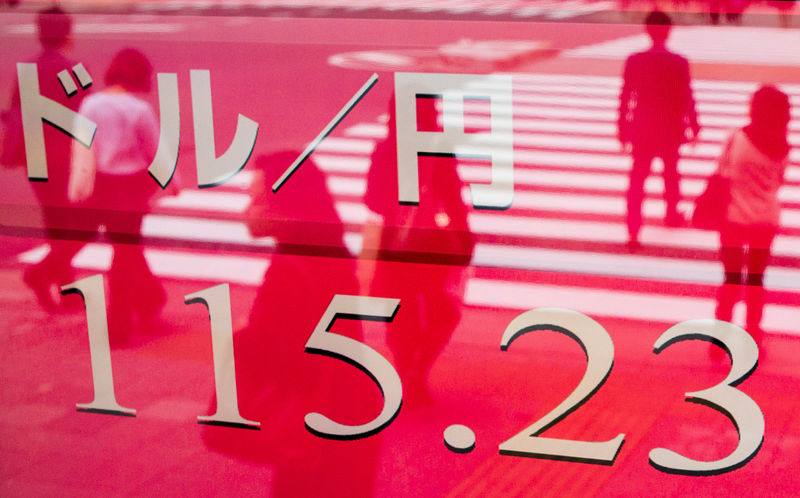Investing.com’s stocks of the week
By Jamie McGeever
LONDON (Reuters) - A draft communique prepared for next week's gathering of G20 finance chiefs has dropped the group's standard pledges on the need for flexible yet stable exchange rates and orderly markets, suggesting it could prove a landmark event for currency markets.
The world's most powerful finance ministers and central bankers convene in the German spa town of Baden-Baden on March 17-18, their first meeting since Donald Trump's U.S. election victory in November and his reaffirmation of an avowedly protectionist, 'America First' stance on international trade.
Solid U.S. economic activity and rising inflation are pushing interest rates and the dollar higher. But the White House would clearly prefer a weaker currency to help U.S. exports, manufacturing and competitiveness on the global stage.
Figures on Tuesday showed the U.S. trade deficit in January was $48.5 billion, the widest in nearly five years.
The draft communique seen by Reuters has removed references to "excess volatility" and "disorderly" FX moves from last year's statement, as well as a pledge to refrain from "competitive devaluations".
It has also reintroduced - for the first time in more than 10 years - a reference to "excessive global imbalances", an apparent swipe at hefty trade surpluses in Germany and China.
Taken together, these changes could be seen as another indication that Washington - without taking direct action or explicitly saying so - is resisting a strong dollar, which it blames for its stubborn trade deficit and manufacturing decline.
The draft communique remains subject to change. And there is unlikely to be any appetite for currency wars, so the pledge to resist "excess volatility and disorderly movements" and refrain from "competitive devaluations" could still get reinserted.
Nevertheless, if the final document bears any resemblance to its current guise, it will be a clear sign that the new White House administration is flexing its muscles on currencies and trade.
"The wording of G7 and G20 statements has been used to justify specific actions or to send specific warnings in the past. If the wording sets the parameters for currency policy, it is therefore significant when it changes," said Simon Derrick, head of global rates strategy at Bank of New York Mellon (NYSE:BK).
Derrick pointed to the G7 wording on exchange rate 'flexibility' in Dubai, 2003, and 'global current account imbalances' in Boca Raton, 2004. Whatever was said at the time about what they meant, the fact is that Japan stopped intervening in FX markets to weaken the yen in 2004, he said.
"STRONG MESSAGE"
G20 members are unlikely to want their own currencies to appreciate much, if at all. But the reintroduction of the phrase on "global imbalances", at a time when trade is firmly back on the international political agenda, "is clearly intended to send a strong message", Derrick added.
One G20 government official said the group was still debating exactly what signal it wanted to send on FX: "Whatever it is, we want to make sure it's not misunderstood by markets."
Since Trump's election victory in November the White House has accused Japan, China and Germany - three of America's five biggest trading partners - of deliberately engineering undervalued exchange rates for competitive advantage, drawing frosty responses and stirring currency market volatility.
The dollar hit a 14-year high in January (DXY) and the latest Reuters poll of more than 60 FX strategists shows the bias is for further strength over the coming year. http://tmsnrt.rs/2k8GCSM
Treasury Secretary Steve Mnuchin, who was only confirmed in his post on Feb. 13, has repeated the Treasury's long-held mantra that a strong dollar is a "good thing" as it reflects confidence in the relative strength of the U.S. economy.
But he has warned that "certain aspects are not as positive" in the short term, and also told International Monetary Fund Managing Director Christine Lagarde he expects the IMF to provide "frank and candid" analysis of exchange rate policies.
Since G20 finance ministers and central bank governors began meeting in 1999, and then leaders in 2008, the role of exchange rates "to reduce countries' vulnerability to economic crises" has consistently been discussed, according to the G20 Research Group at the University of Toronto.
SURPLUSES
Ernst Welteke, former president of Germany's Bundesbank and a veteran of several G7 meetings, said that if countries want to improve their competitiveness on the international stage they should address their own problems themselves.
"The German surplus is always a concern for others, but the only way to address this is to become more competitive," Welteke told Reuters.
"It's not the exchange rate that's responsible for the German trade surplus, it's the quality of the product. What are you going to do – tell China to import less?"
On March 15, two days before the G20 meeting starts, the Federal Reserve is widely expected to hike U.S. interest rates again, a move that could further cement the dollar's status as the currency of choice for global FX investors.
The greenback has been climbing steadily since 2014, gaining almost 30 percent in the last two years and culminating in a 14-year high on a trade-weighted basis in January.
But that's almost certainly not enough to warrant any official action. Not yet, anyway.
In the early 1980s, the dollar surged 80 percent under then-president Ronald Reagan, prompting Federal Reserve chairman Paul Volcker to forge a rare G7 agreement - although only 5 nations participated - to bring it back down. That was the "Plaza Accord", the most renowned and successful example of coordinated currency market intervention of modern times.
According to the IMF, the dollar was 30 percent over-valued at the time of Plaza, which is around twice the mid-point over-valuation of 15 percent estimated last year.
